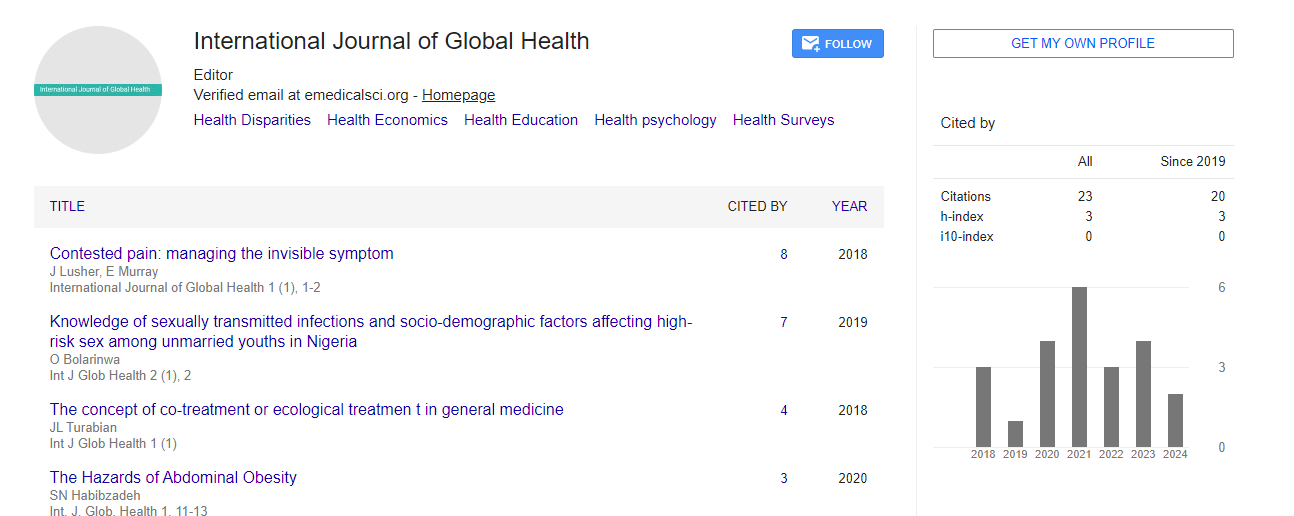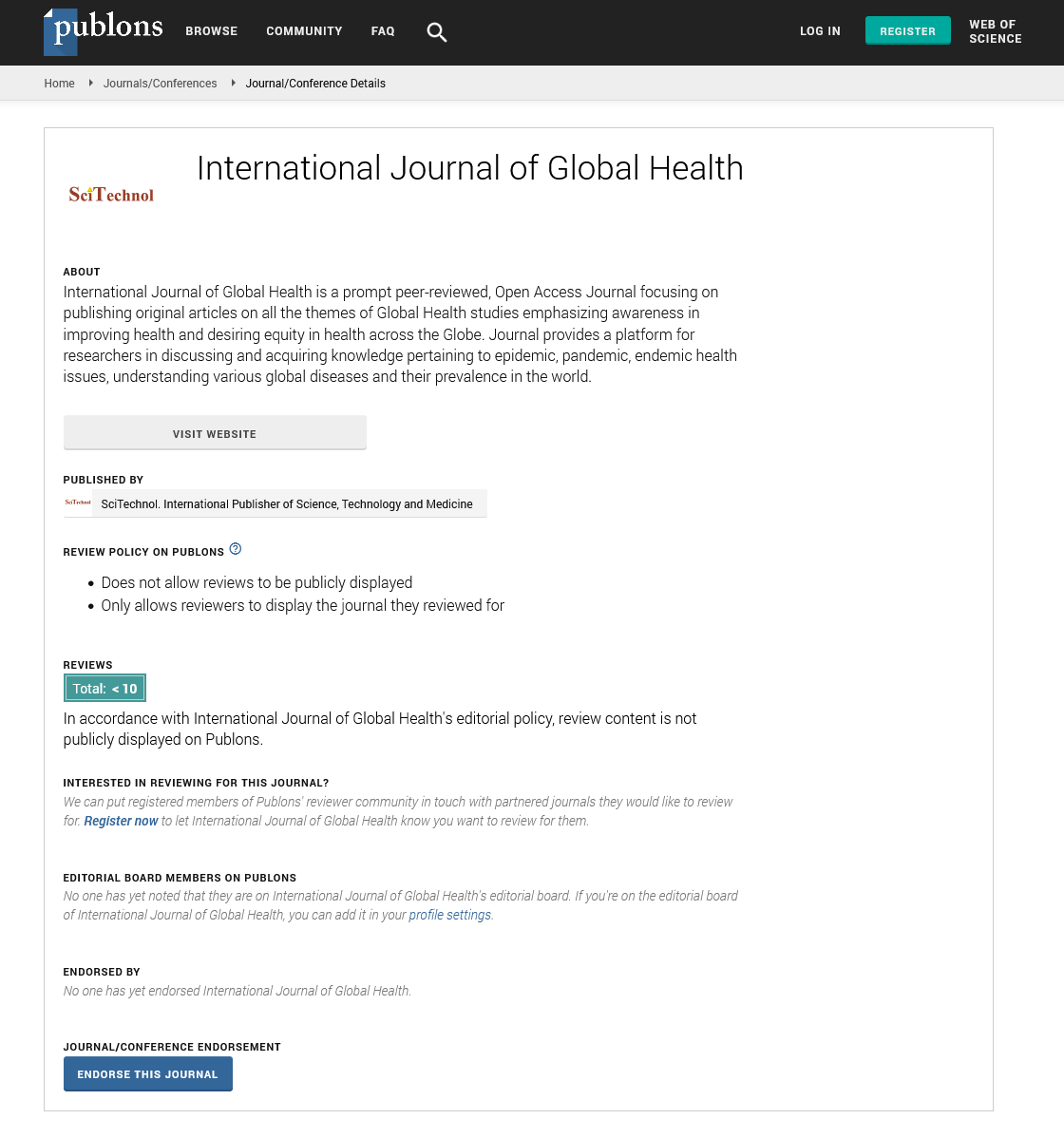Perspective, Int J Glob Health Vol: 6 Issue: 2
Poverty: Understanding the Struggle and Pursuing Equitable Solutions
Hirofumi Hiramatsu*
1Department of Global Health, Keio University, Tokyo, Japan
*Corresponding Author: Hirofumi Hiramatsu,
Department of Global Health, Keio University, Tokyo, Japan
E-mail: hiro@fumi.jp
Received date: 24 May, 2023, Manuscript No. IJGH-23-107367;
Editor assigned date: 26 May, 2023, PreQC No. IJGH-23-107367 (PQ);
Reviewed date: 09 June, 2023, QC No. IJGH-23-107367;
Revised date: 16 June, 2023, Manuscript No. IJGH-23-107367 (R);
Published date: 23 June, 2023 DOI: 10.4172/Ijgh.1000186
Citation: Hiramatsu H (2023) Poverty: Understanding the Struggle and Pursuing Equitable Solutions. Int J Glob Health 6:2.
Description
Poverty is a pervasive global issue that affects millions of individuals and communities worldwide. It is a multidimensional problem that encompasses economic, social, and political aspects, leaving a profound impact on people’s lives. This study will explore the concept of poverty, its causes and consequences, and the importance of pursuing equitable solutions to alleviate poverty and promote sustainable development.
Defining poverty
Poverty is often defined as a state of deprivation characterized by a lack of basic necessities and resources necessary for an individual’s well-being. These necessities include access to food, clean water, shelter, education, healthcare, and economic opportunities. Poverty can manifest in different forms, such as extreme poverty, absolute poverty, or relative poverty, and can vary across regions and socio- economic contexts.
Causes and consequences of poverty
Poverty is a complex issue with multiple underlying causes. Some key factors that contribute to poverty include
Lack of education: Limited access to quality education and low literacy rates hinder individuals’ ability to acquire skills and secure employment, perpetuating the cycle of poverty.
Unemployment and low wages: Insufficient job opportunities, particularly in developing countries, often result in high levels of unemployment or underemployment, leaving individuals and families trapped in poverty. Inadequate wages for work further perpetuate economic inequality and hinder upward mobility.
Discrimination and inequality: Social inequalities, including gender, racial, and ethnic disparities, contribute to the persistence of poverty. Discrimination and marginalization can restrict access to resources, services, and opportunities, perpetuating cycles of poverty within certain groups.
Lack of social safety nets: Insufficient social protection systems, including limited access to healthcare, social assistance, and insurance, leave vulnerable populations at risk of falling into poverty during times of crisis or unforeseen circumstances.
The consequences of poverty are far-reaching and affect all aspects of individuals’ lives, including health, education, housing, and overall well-being. Poverty restricts access to quality healthcare, leading to higher rates of illness and shorter life expectancy. Lack of access to education perpetuates generational poverty, hindering social mobility and perpetuating inequality. Poverty also increases the risk of food insecurity, inadequate housing, and social exclusion, further exacerbating the challenges faced by individuals and communities.
Addressing poverty
Pursuing equitable solutions: Efforts to alleviate poverty must go beyond short-term assistance and focus on long-term, sustainable solutions. Here are key approaches to address poverty
Education and skill development: Investing in quality education and vocational training equips individuals with the knowledge and skills needed to secure better job opportunities, break the cycle of poverty, and foster economic growth. Governments, communities, and international organizations must prioritize education and ensure equal access for all, particularly marginalized groups.
Economic empowerment: Creating an enabling environment for economic growth and providing support for entrepreneurship and small businesses can stimulate job creation and income generation. Microfinance initiatives, access to credit, and vocational training programs can empower individuals to build sustainable livelihoods and escape poverty.
Social protection and safety nets: Establishing robust social protection systems, including access to healthcare, social assistance programs, and unemployment benefits, provides a safety net for vulnerable populations during times of economic instability or crisis.
Gender equality and social inclusion: Addressing gender disparities and promoting social inclusion are critical components of poverty reduction strategies. Women, ethnic minorities, and marginalized communities often face disproportionate barriers to opportunities and resources. Ensuring equal rights and access to resources empowers individuals and promotes equitable development.
Sustainable development: Environmental sustainability is intrinsically linked to poverty reduction. Promoting sustainable practices, such as renewable energy, sustainable agriculture, and responsible resource management, can generate employment, improve living conditions, and protect natural resources for future generations.
Strengthening governance and institutions: Addressing corruption, promoting transparency, and strengthening institutions are essential to ensure equitable resource allocation, effective service delivery, and the protection of citizens’ rights. Good governance is critical for poverty reduction and sustainable development.
Conclusion
Poverty is a complex and multifaceted issue that demands comprehensive and equitable solutions. By addressing the root causes of poverty and implementing strategies that promote education, economic empowerment, social protection, and sustainable development, one can make significant strides towards poverty reduction and create a more just and equitable world. Collaboration between governments, civil society, international organizations, and communities is essential to achieving meaningful and sustainable change, ensuring that no one is left behind in the pursuit of a povertyfree future.
 Spanish
Spanish  Chinese
Chinese  Russian
Russian  German
German  French
French  Japanese
Japanese  Portuguese
Portuguese  Hindi
Hindi 
